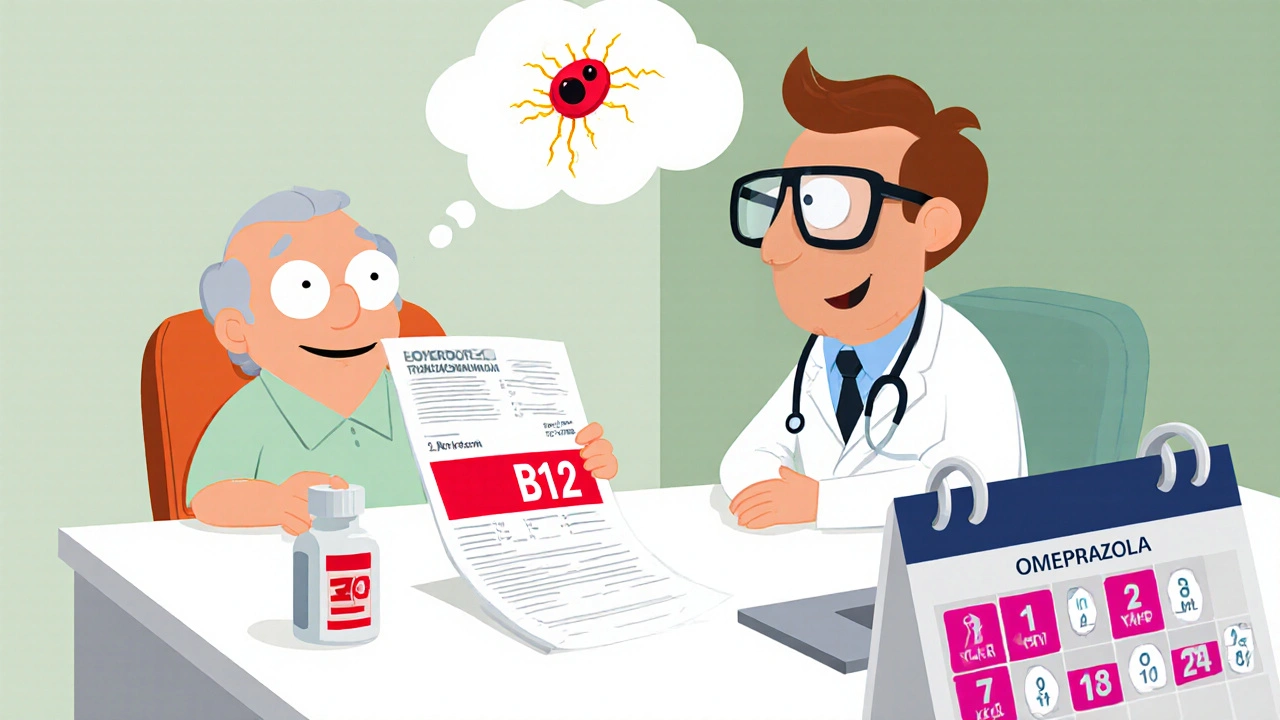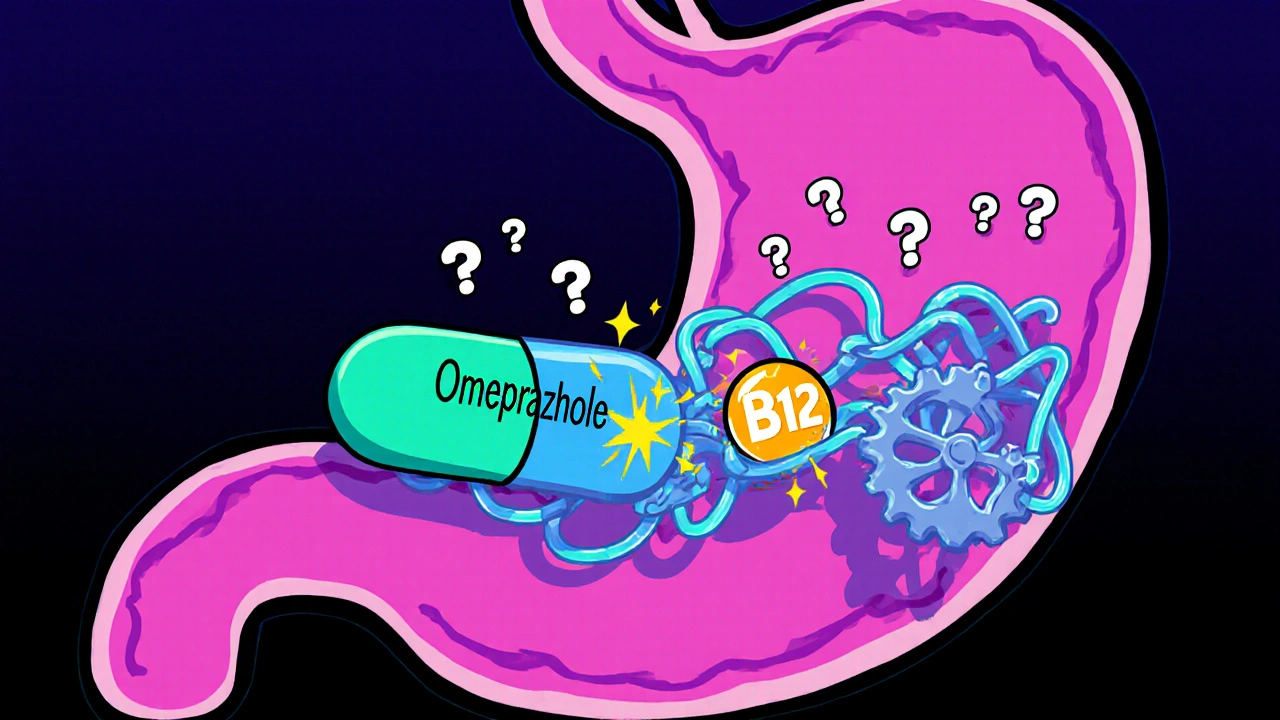Omeprazole B12 Deficiency Risk Calculator
Assess Your Risk
This tool estimates your risk of vitamin B12 deficiency based on omeprazole usage duration and other factors.
Risk Assessment Result
When you take Omeprazole is a proton‑pump inhibitor that reduces stomach acid production by blocking the H⁺/K⁺‑ATPase enzyme, you might wonder if it messes with your vitamin B12 levels. Vitamin B12 deficiency is a condition where the body lacks enough cobalamin to support red blood cell formation and nerve health. In the next sections we’ll unpack why these two often show up together, who should watch out, and practical steps to keep the balance right.
What Omeprazole Actually Does
Omeprazole belongs to the class of drugs called proton‑pump inhibitors (PPIs). It binds irreversibly to the gastric H⁺/K⁺‑ATPase located in the parietal cells of the stomach lining, shutting down the final step of acid secretion. The result is a sustained rise in gastric pH that can last up to 24 hours after a single dose.
Typical uses include gastro‑esophageal reflux disease (GERD), peptic ulcers, and Zollinger‑Ellison syndrome. Because the drug is taken once daily and has a favorable safety profile, many patients stay on it for months or even years.
Why Stomach Acid Matters for Vitamin B12
Vitamin B12 in food is bound to protein. The acidic environment of the stomach, together with pepsin, releases B12 from this protein matrix. Once free, B12 binds to a carrier called intrinsic factor (IF), a glycoprotein secreted by gastric chief cells. The IF‑B12 complex travels to the ileum, where specific receptors (cubilin‑amnionless) absorb it into circulation.
If acid production is too low, the liberation step falters. Less free B12 means less IF binding, and ultimately, reduced absorption. This chain reaction is the core of the Omeprazole vitamin B12 deficiency link.
How Strong Is the Evidence?
Several longitudinal studies have tracked patients on PPIs for up to five years. One 2022 cohort of 12,000 adults found a 25 % higher odds of having serum B12 < 200 pg/mL after three years of daily omeprazole compared to non‑users. Another meta‑analysis of 14 trials reported a pooled risk ratio of 1.32 for B12 deficiency among chronic PPI users.
While the numbers are not as dramatic as with malabsorption syndromes like pernicious anemia, the trend is consistent: longer exposure → higher risk. The effect is most noticeable in older adults, who already have declining gastric acid output.

Who Should Be Most Concerned?
- Elderly patients: Age‑related hypochlorhydria compounds the acid‑suppression effect.
- People on high‑dose or multiple PPIs: Higher cumulative inhibition intensifies the barrier to B12 release.
- Individuals with dietary restrictions: Vegans and vegetarians already consume less B12, so any absorption drop hits harder.
- Patients with pre‑existing malabsorption: Conditions like Crohn’s disease or prior gastric surgery further limit absorption.
If you fall into any of these groups, a proactive approach can prevent subtle neurologic or hematologic problems down the line.
Spotting the Signs Early
Vitamin B12 deficiency can masquerade as fatigue, mild memory lapses, or tingling in the hands and feet. Laboratory testing remains the gold standard:
- Serum B12 level - values < 200 pg/mL usually flag a deficiency.
- Methylmalonic acid (MMA) - rises early when B12 is low, even if serum B12 looks borderline.
- Homocysteine - another early marker that climbs with B12 insufficiency.
- Complete blood count - look for macrocytic anemia (MCV > 100 fL).
Because serum B12 can be misleading in the elderly, many clinicians now order MMA and homocysteine together for a clearer picture.
Managing the Risk: Practical Steps
Below is a checklist you can follow if you’re on omeprazole long‑term.
- Ask about dosage: The lowest effective dose often suffices. Switching from 40 mg to 20 mg daily can cut acid suppression in half.
- Consider on‑demand use: Many patients can take PPIs only when symptoms flare, rather than continuously.
- Test annually: A simple serum B12 check every 12 months catches declines before symptoms appear.
- Supplement when needed: Oral cyanocobalamin (1 000 µg daily) is effective for mild drops. For severe cases, sublingual or intramuscular injections bypass gastric steps entirely.
- Boost dietary sources: Include fortified cereals, dairy, eggs, and, if you’re not vegan, fish or meat.
- Check other meds: Metformin, H2 blockers, and certain antibiotics also interfere with B12 absorption.
Risk Comparison Table
| Duration of Use | Average Serum B12 Change | Relative Risk Increase |
|---|---|---|
| Less than 6 months | -5 pg/mL | 1.0 (baseline) |
| 6-12 months | -12 pg/mL | 1.15 |
| 1-3 years | -22 pg/mL | 1.28 |
| More than 3 years | -35 pg/mL | 1.45 |
Numbers are averages from pooled observational studies; individual changes can vary based on diet, genetics, and overall health.

When to Talk to Your Doctor
If you notice any of the following, schedule a visit:
- Persistent fatigue that doesn’t improve with rest. \n
- Unexplained mood changes, depression, or memory fog.
- Tingling, numbness, or weakness in the limbs.
- Glossy, sore tongue (glossitis).
These symptoms often overlap with other conditions, but a quick B12 panel can rule out deficiency early.
Alternative Acid‑Suppressing Strategies
If the risk feels too high, discuss alternatives with your prescriber. H2 blockers (e.g., ranitidine, famotidine) reduce acid less dramatically and may carry a smaller B12 impact. Lifestyle tweaks-weight loss, head‑of‑bed elevation, and avoiding late‑night meals-also alleviate reflux without medication.
Bottom Line
Omeprazole is a powerful tool for acid‑related disorders, but long‑term use can tip the scales toward vitamin B12 deficiency, especially in older or diet‑restricted adults. Regular testing, dose optimization, and targeted supplementation keep the benefits of acid control while safeguarding nerve and blood health.
Can a short course of omeprazole cause B12 deficiency?
Short courses (under 4 weeks) rarely affect B12 levels because the body’s stores last several years. The risk rises sharply after months of daily use.
Is it safe to take a B12 supplement while on omeprazole?
Yes. Oral cyanocobalamin or methylcobalamin absorbs well even with reduced acid. For severe drops, intramuscular injections bypass the gut entirely.
Do other PPIs have the same B12 risk?
All PPIs lower acid, so the mechanism is similar. However, individual drugs differ in potency and half‑life, which can slightly modify risk. Monitoring remains wise for any long‑term PPI.
What diet helps maintain B12 while on a PPI?
Focus on animal‑derived foods: meat, fish, dairy, and eggs. If you’re vegan, choose fortified plant milks, cereals, and consider a monthly B12 injection.
Can I switch from omeprazole to an H2 blocker to protect my B12?
Often yes, especially for mild‑to‑moderate reflux. H2 blockers lower acid less aggressively, reducing the impact on B12 release. Talk to your doctor about a safe transition.


Comments
Kimberly Lloyd
October 21, 2025 AT 18:53Wow, this breakdown really shines a light on something many of us overlook. It’s reassuring to see that regular B12 checks can keep us on track while still benefiting from Omeprazole. I love how you highlighted both the science and the practical steps – it makes the whole thing feel manageable. For anyone feeling anxious, just remember that the body stores B12 for years, so occasional dips aren’t catastrophic. Keep the conversation going and stay curious about your health!
Erika Thonn
October 28, 2025 AT 15:00One might wonder, do we truly grasp the symbiosis of acid and cobalamin? The stomiac pH is like a silent conductor, orchestrating the release of B12 from food. If we silence the conductor with a pill, the melody falters. Yet, the article forgets that diet plays a role-caffeeine might also affect absorption. In the grand tapestry of health, each thread matters, even if we sometimes mis‑spell the loom.
Ericka Suarez
November 4, 2025 AT 12:16THIS IS WHAT WE CALL A TRUTH BOMB! THE POWER OF OMEPRAZOLE IS UNMATCHED, BUT DON'T LET IT STEAL YOUR B12. TAKE A SUPPLEMENT OR FACE THE CONSEQUENCES.
Jake Hayes
November 11, 2025 AT 09:33Short on time? Test your B12 annually.
parbat parbatzapada
November 18, 2025 AT 06:50Did you ever think the pharma giants are hiding the real side effects? They want us to keep popping pills while they monitor our labs. It’s like a secret agenda baked into every prescription. Trust nobody, especially when your gut is being weaponized.
Casey Cloud
November 25, 2025 AT 04:06From a clinical perspective, the key is dose optimization. Start at the lowest effective amount and reassess after three months. If you’re over 60, consider combining a yearly B12 panel with MMA testing for a clearer picture. Also, watch out for meds like metformin that compound the problem. Staying proactive saves you from downstream neuropathy issues.
Eryn Wells
December 2, 2025 AT 01:23Great info! 🌟 Remember, you’re not alone in navigating this – community support can make a huge difference. 🙌 Keep sharing your experiences and let’s keep each other healthy! 😊
Kathrynne Krause
December 8, 2025 AT 22:40Let’s get pumped about staying on top of our health! 🎉 The checklist in the article is pure gold – I’m slapping it on my fridge. Remember, a tiny splash of fortified cereal each morning can be your secret weapon, especially if you’re juggling a busy schedule. Keep the momentum rolling, and don’t let a busy day stop you from snagging that annual B12 test!
Ivan Laney
December 15, 2025 AT 19:56When you look at the data, the story unfolds like a saga spanning decades of clinical observation. First, the pharmacodynamics of Omeprazole set the stage by raising gastric pH, which in turn thwarts the release of B12 from dietary proteins. Second, the intrinsic factor, a crucial co‑factor, cannot bind what isn’t liberated, and that cascade leads directly to malabsorption. Third, epidemiological studies consistently flag a 20‑30% elevation in deficiency risk after three years of continuous therapy. Fourth, age compounds the problem; the elderly already experience hypochlorhydria, so adding a PPI amplifies the deficit. Fifth, dietary patterns matter – vegans rely entirely on fortified sources, making them vulnerable if absorption drops. Sixth, the biochemical markers-MMA and homocysteine-rise before serum B12 levels dip, offering an early warning system. Seventh, clinicians can intervene with low‑dose supplementation, which bypasses the gastric barrier entirely. Eighth, the cost‑benefit analysis still favors PPIs for severe GERD, but only when paired with vigilant monitoring. Ninth, alternative therapies such as H2 blockers can provide comparable symptom relief with a milder impact on acid production. Tenth, lifestyle modifications-weight loss, head‑of‑bed elevation, and dietary timing-can reduce reliance on medication. Eleventh, patient education is paramount; many are unaware of this hidden risk. Twelfth, the literature suggests that intermittent PPI use, rather than daily dosing, mitigates the B12 decline. Thirteenth, some genomic variants affect cobalamin transport, explaining individual susceptibility. Fourteenth, the overarching lesson is balance: harness the benefits of acid suppression while safeguarding micronutrient status through proactive testing and supplementation. Fifteenth, remember that the body stores B12 for years, but a steady drain will eventually deplete reserves, leading to neurologic and hematologic consequences if unaddressed.
Sakib Shaikh
December 22, 2025 AT 17:13In my experience, the numbers don’t lie-long‑term users of any PPI, not just Omeprazole, show subtle drops in B12. The mechanism is universal: acid suppression hinders the detachment of cobalamin from food. So, don’t think you’re safe just because you switched brands. Keep testing, keep supplementing if needed, and stay vigilant.
Devendra Tripathi
December 29, 2025 AT 14:30While the article emphasizes testing, I’d argue that the real issue is overprescription. Many patients stay on PPIs for years without a clear indication. If you can manage reflux with diet and lifestyle, you’re less likely to trigger a B12 deficiency. So, challenge the habit of auto‑refill prescriptions.
Vivian Annastasia
January 5, 2026 AT 11:46Oh sure, just add another pill to your regimen. Because that’s exactly what the world needs – more supplements. 🙄
John Price
January 12, 2026 AT 09:03Valid point. Simpler is often better.
Nick M
January 19, 2026 AT 06:20Honestly, the whole debate feels like a recycled conspiracy. You’ve got pharma, you’ve got gut health, you’ve got a handful of labs – it’s all noise until a real patient shows up with neuropathy. Until then, I’ll stick to my coffee and ignore the hype.
eric smith
January 26, 2026 AT 03:36Thanks for the post, but let’s be real: if you’re already on a PPI, you might as well just take a B12 gummy and call it a day. No need for endless testing.